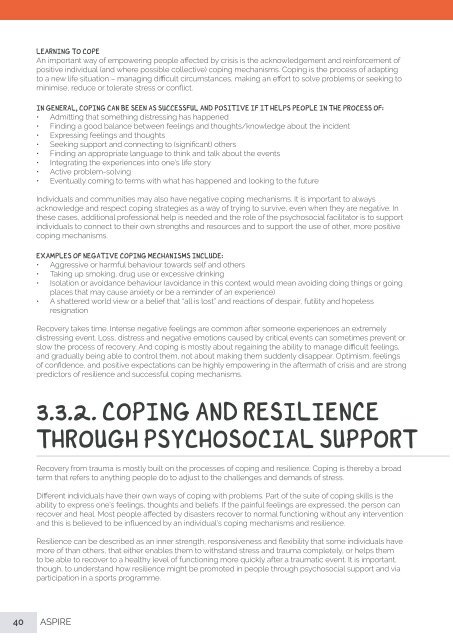181208_Training-Module_interactive
Create successful ePaper yourself
Turn your PDF publications into a flip-book with our unique Google optimized e-Paper software.
LEARNING TO COPE<br />
An important way of empowering people affected by crisis is the acknowledgement and reinforcement of<br />
positive individual (and where possible collective) coping mechanisms. Coping is the process of adapting<br />
to a new life situation – managing difficult circumstances, making an effort to solve problems or seeking to<br />
minimise, reduce or tolerate stress or conflict.<br />
IN GENERAL, COPING CAN BE SEEN AS SUCCESSFUL AND POSITIVE IF IT HELPS PEOPLE IN THE PROCESS OF:<br />
• Admitting that something distressing has happened<br />
• Finding a good balance between feelings and thoughts/knowledge about the incident<br />
• Expressing feelings and thoughts<br />
• Seeking support and connecting to (significant) others<br />
• Finding an appropriate language to think and talk about the events<br />
• Integrating the experiences into one’s life story<br />
• Active problem-solving<br />
• Eventually coming to terms with what has happened and looking to the future<br />
Individuals and communities may also have negative coping mechanisms. It is important to always<br />
acknowledge and respect coping strategies as a way of trying to survive, even when they are negative. In<br />
these cases, additional professional help is needed and the role of the psychosocial facilitator is to support<br />
individuals to connect to their own strengths and resources and to support the use of other, more positive<br />
coping mechanisms.<br />
EXAMPLES OF NEGATIVE COPING MECHANISMS INCLUDE:<br />
• Aggressive or harmful behaviour towards self and others<br />
• Taking up smoking, drug use or excessive drinking<br />
• Isolation or avoidance behaviour (avoidance in this context would mean avoiding doing things or going<br />
places that may cause anxiety or be a reminder of an experience)<br />
• A shattered world view or a belief that “all is lost” and reactions of despair, futility and hopeless<br />
resignation<br />
Recovery takes time. Intense negative feelings are common after someone experiences an extremely<br />
distressing event. Loss, distress and negative emotions caused by critical events can sometimes prevent or<br />
slow the process of recovery. And coping is mostly about regaining the ability to manage difficult feelings,<br />
and gradually being able to control them, not about making them suddenly disappear. Optimism, feelings<br />
of confidence, and positive expectations can be highly empowering in the aftermath of crisis and are strong<br />
predictors of resilience and successful coping mechanisms.<br />
3.3.2. COPING AND RESILIENCE<br />
THROUGH PSYCHOSOCIAL SUPPORT<br />
Recovery from trauma is mostly built on the processes of coping and resilience. Coping is thereby a broad<br />
term that refers to anything people do to adjust to the challenges and demands of stress.<br />
Different individuals have their own ways of coping with problems. Part of the suite of coping skills is the<br />
ability to express one’s feelings, thoughts and beliefs. If the painful feelings are expressed, the person can<br />
recover and heal. Most people affected by disasters recover to normal functioning without any intervention<br />
and this is believed to be influenced by an individual’s coping mechanisms and resilience.<br />
Resilience can be described as an inner strength, responsiveness and flexibility that some individuals have<br />
more of than others, that either enables them to withstand stress and trauma completely, or helps them<br />
to be able to recover to a healthy level of functioning more quickly after a traumatic event. It is important,<br />
though, to understand how resilience might be promoted in people through psychosocial support and via<br />
participation in a sports programme.<br />
40 ASPIRE




